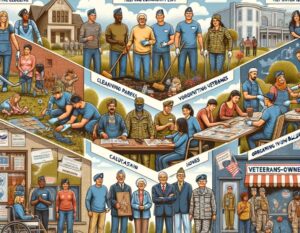Transitioning from military to civilian life can be challenging, but you don’t have to face it alone. Veterans support groups offer camaraderie, understanding, and resources that can make a significant difference in your post-military journey. This comprehensive guide will help you find and connect with veterans support groups across the USA.
Why Join a Veterans Support Group?
Understanding the benefits of veterans support groups can motivate you to take that first step in joining one.
Benefits of Veterans Support Groups:
- Shared experiences and understanding
- Emotional support and camaraderie
- Access to resources and information
- Opportunity to help fellow veterans
- Sense of community and belonging
Remember: You’re not alone in your journey. Support groups can provide valuable connections.
Types of Veterans Support Groups
There are various types of support groups catering to different needs and preferences.
Common Types of Support Groups:
- General Veterans Groups
- PTSD Support Groups
- Women Veterans Groups
- LGBTQ+ Veterans Groups
- Combat Veterans Groups
- Family and Caregiver Support Groups
Consider your specific needs and interests when choosing a group.
National Veterans Organizations
Several national organizations offer support groups and local chapters across the country.
Major National Veterans Organizations:
| Organization | Focus Areas |
|---|---|
| American Legion | General support, advocacy |
| Veterans of Foreign Wars (VFW) | Combat veterans, advocacy |
| Disabled American Veterans (DAV) | Disabled veterans, benefits assistance |
| Iraq and Afghanistan Veterans of America (IAVA) | Post-9/11 veterans |
| Wounded Warrior Project | Wounded veterans, mental health |
These organizations often have local chapters that offer regular meetings and events.
Finding Local Support Groups
Local support groups can provide more personalized and accessible support.
Ways to Find Local Support Groups:
- Contact your local VA office
- Check with nearby military bases
- Search online directories (e.g., National Resource Directory)
- Ask at local community centers or places of worship
- Inquire at veterans service organizations (VSOs)
Don’t hesitate to reach out – many groups welcome new members.
Online Support Communities
In the digital age, online support communities offer convenience and accessibility.
Popular Online Veterans Communities:
- RallyPoint
- Veterans.com
- Military.com forums
- Reddit’s r/Veterans
- Facebook veterans groups
Online communities can be especially helpful if you live in a remote area or have mobility issues.
Specialized Support Groups
Some groups focus on specific experiences or demographics within the veteran community.
Examples of Specialized Support Groups:
- Military Sexual Trauma (MST) support groups
- Minority veterans groups
- Student veterans associations
- Veteran entrepreneurs networks
- Veterans in recovery groups
These specialized groups can offer targeted support for specific challenges or experiences.
Starting Your Own Support Group
If you can’t find a group that meets your needs, consider starting your own.
Steps to Start a Support Group:
- Identify your target audience and purpose
- Find a meeting location (or set up online meetings)
- Establish ground rules and structure
- Promote your group through local VA offices, social media, and community centers
- Consider partnering with existing veterans organizations for resources and support
Starting a group can be rewarding and help fill gaps in your community’s support network.
Making the Most of Support Group Meetings
Once you’ve found a group, it’s important to engage effectively.
Tips for Engaging in Support Groups:
- Be open and honest about your experiences
- Respect others’ privacy and confidentiality
- Listen actively and empathetically
- Participate regularly to build relationships
- Offer support to others when you’re able
Remember, support groups are most effective when members actively participate and support each other.
Overcoming Barriers to Participation
Some veterans may face challenges in joining or attending support groups.
Common Barriers and Solutions:
- Transportation issues: Look for groups that offer virtual meetings or carpool options
- Time constraints: Seek groups with flexible meeting times or online forums
- Social anxiety: Start with online groups or bring a buddy to in-person meetings
- Stigma: Remember that seeking support is a sign of strength, not weakness
- Lack of information: Reach out to local VA offices or veterans organizations for guidance
Don’t let these barriers prevent you from accessing valuable support.
Supporting Family Members
Family members of veterans can also benefit from support groups.
Support Groups for Families:
- Military spouses groups
- Children of veterans groups
- Caregiver support networks
- Gold Star families organizations
- Parents of service members groups
Encourage your family members to seek support – their well-being is important too.
Evaluating the Effectiveness of a Support Group
Not all groups will be the right fit for everyone. It’s important to evaluate if a group is meeting your needs.
Signs of an Effective Support Group:
- You feel comfortable and respected
- The group maintains confidentiality
- You leave meetings feeling supported and encouraged
- There’s a good balance of sharing and listening
- The group provides useful resources or information
If a group doesn’t feel right, don’t hesitate to try others until you find your fit.
Frequently Asked Questions
Q: Do I need to be receiving VA benefits to join a veterans support group? A: No, most support groups are open to all veterans regardless of their benefits status.
Q: Are there costs associated with joining veterans support groups? A: Many groups are free, but some may have nominal fees for activities or memberships.
Q: Can I attend a support group if I’m still on active duty? A: Yes, many groups welcome active duty service members, especially those preparing for transition.
Q: How do I know if a support group is legitimate? A: Check if the group is affiliated with recognized veterans organizations or endorsed by the VA.
Q: Can I attend multiple support groups? A: Absolutely! Many veterans find value in participating in different groups for various needs.
Conclusion
Finding your tribe through veterans support groups can be a transformative experience in your post-military life. These groups offer more than just support; they provide a sense of belonging, understanding, and camaraderie that is often missed after leaving the military.
Remember, seeking support is not a sign of weakness, but a step towards strength and resilience. Whether you’re dealing with the challenges of transition, coping with service-related issues, or simply looking to connect with others who share your experiences, there’s a support group out there for you.
Don’t be discouraged if the first group you try isn’t the perfect fit. Like finding the right unit in the military, finding the right support group may take some time and effort. Keep exploring until you find the community that resonates with you.
By connecting with fellow veterans, you’re not only helping yourself but also contributing to a support network that strengthens the entire veteran community. Your experiences and insights can be invaluable to others who are on similar journeys.
Remember, the bonds formed in military service don’t end when you hang up your uniform. Through veterans support groups, you can continue to experience the unity, support, and shared purpose that were hallmarks of your military experience. Take that first step, reach out, and find your tribe. Your fellow veterans are waiting to welcome you.




